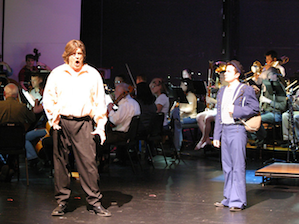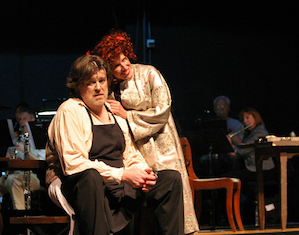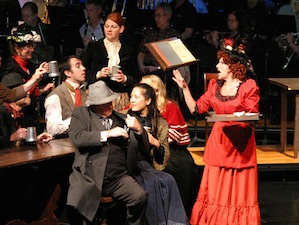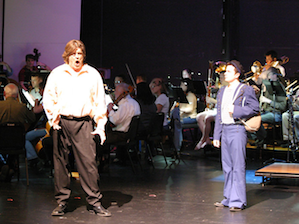
Photos by Barbara Heninger
The lush orchestral sound of Stephen Sondheim's operatic-symphonic musicals is usually heard half-buried from the pit or, at most school and community performances, from a band. (The weekend's other local Sondheim, Ray of Light's Into the Woods, has a super-talented small band, but eight players an orchestra do not make.)
In a welcome alternative, Eric Kujawsky's Redwood Symphony did full justice to the rich, Jonathan Tunick-orchestrated Sondheim score of Sweeney Todd over the weekend in Cañada College's sprawling Main Theater, defying all odds (about which more below). Strings, woodwinds, brass, and the malevolent organ (played by Delphean Quan) were all splendid; Kujawsky elicited consistent balance from the 50-piece ensemble, bringing out gorgeous layers of sound.
Concertmaster Heather Katz, principals Doug Tomm (viola), Amy Brooks (cello), Brian Link (bass), Dan Swinehart (trumpet), and Kristen Arrendt (trombone) shone in leading their sections.

The audience so much appreciated the orchestra's work that a collective shudder was felt through the theater when Todd (Walter Mayes) and Mrs. Lovett (Cami Thompson) contemplated who should be on the menu in the riotous duet "Have A Little Priest," and they closely inspected violist Peter Haas and flutist/piccolo player Patricia Harrell during added lyrics about musicians-for-lunch, following:
"... We have some shepherd's pie peppered
With actual shepherd
On top.
Here's a politician — so oily
It's served with a doily ..."
...
"Is that squire
On the fire?
Mercy no, sir,
Look closer,
You'll notice it's grocer.
Looks thicker.
More like vicar.
No, it has to be grocer — it's green."

Happy to report that Haas and Harrell kept playing and escaped without a single bite.
About the difficulties: With only 516 seats, the unusually wide theater feels much larger, and it has challenging acoustics.
With the full orchestra seated on one side of the 45-foot-wide stage, and all principal singers using body mikes, their volume cranked way up, there were problems, especially when two singers stood close to each other and their mikes picked up two voices, producing a double amplification.
Even with all the electronics, which normally equalizes voices, there were big differences in the performances. Mayes was an overwhelming Todd, a big man with a big voice, and fine diction — an indispensable requirement for Sondheim. Thompson's flaming redhead Mrs. Lovett, took in stride being dwarfed in size and voice by Mayes, and she was having (and providing) a great time.
Justin Marsh, as Anthony — the romantic lead in a thoroughly unromantic musical — performed miraculously, every note in place, every word clear, overcoming the pitfalls of electronics. His love interest, Johanna, sung by the young and talented Maya Kherani, struggled with the difficult tessitura, and registered near zero on the diction meter; for this fan of the singer, her performance was a disappointment, but I hope for a bright future in other, more suitable roles.
Phil Lowery's stage direction moved principals smoothly, but got bogged down a few times in crowd scenes. Michael Morris' Judge Turpin, Bobby Bryce's Tobias, and Bill Welch's Pirelli were excellent. Mia Fryvecind Gimenez's Beggar Woman was especially memorably, in singing and acting.
At the end, to this Sondheim fan — no, maniac — the most important element of the show was Kujawsky's musical direction and the storming-enchanting Redwood Symphony. May they do more Sondheim.
Speaking of the future, check out the orchestra's next season: Enesco, Riegger (!), Strauss, Scott, Holst, Ligeti, Adams, Gottschalk, Schnittke, Shostakovich ... an amazing lineup, its adventurousness putting to shame some "big-city" orchestras.

